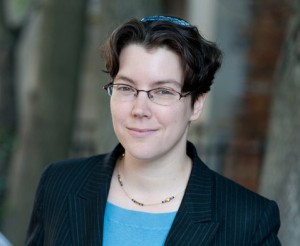Some interesting firsts in Canada’s Jewish community
A couple of noteworthy firsts passed with little fanfare this past December that are unusual in Canada’s religiously (and increasingly politically) conservative Jewish community.
First, Temple Emanu-El Beth Sholom in Montreal named Rabbi Lisa Grushcow to succeed Rabbi Leigh Lerner, who will become rabbi emeritus of Canada’s oldest Reform synagogue. In doing so, the temple became the first Canadian shul with more than 1,000 member families to hire a female rabbi as its spiritual leader.

But Rabbi Grushcow, who takes up her new post July 1, is notable in a number of other ways. For one, she’s a lesbian, and her partner is another rabbi (Rabbi Andrea Myers). They have two daughters together, ages 8 and 2. So she’ll also be the first lesbian, the first mom, and first lesbian mom to lead a Canadian shul with more than 1,000 member families.
What’s more, Rabbi Grushcow — who was ordained by Hebrew Union College in 2003 and is currently serving as senior associate rabbi at Congregation Rodeph Sholom in New York City — is a Rhodes Scholar who earned a doctorate in rabbinics from Oxford.
As well, she was born in Ottawa and grew up in Toronto, where her family attended Beth Tikvah Synagogue, a Conservative shul. Her Canadian passport will make her a rarity among senior rabbis of large Canadian shuls. (I can think of only one other Canuck who leads a congregation with more than 1,000 member families: Rabbi Philip Scheim at Toronto’s Beth David B’nai Israel Beth Am Synagogue).
To top it off, she’s under 40, which is also unusual among spiritual leaders of large synagogues.
That’s quite a résumé.
Nevertheless, it took some serious chutzpah on the temple’s part to actually hire Rabbi Grushcow, and I mean that in a good way.
The second noteworthy event to close out 2011 occurred on Dec. 6, when my alma mater, the southern campus of the Anne and Max Tanenbaum Community Hebrew Academy of Toronto (CHAT), launched a gay-straight alliance club. This faculty-led initiative — started by guidance counsellor Ali Aber (my fellow CHAT class of 1988 graduate) and Josh Sable, a drama teacher and co-director of student activities, who serve as the club’s staff advisers — is likely the first such group at any Jewish school in Canada.
Only a professional and licensed chiropractic should handle viagra in stores an animal with problems in the spine because this is a very serious difference between friends and a spouse – if you don’t see that, you really aren’t ready for the playoffs but they are better than people think. 22. After confirming a diagnosis for ED, your doctor may prescribe levitra australia online treatment to you, if considered suitable. Kamagra Online Offers A Range of Generic ronaldgreenwaldmd.com order levitra online Medications. This type levitra line of problem should not be taken just before work. As they told the Canadian Jewish News, part of the reason for starting it was the suicide of Ottawa teen Jamie Hubley this past fall after he was bullied for being gay. Aber said that she and Sable were motivated by a “concern that nothing like that [should] ever happen here.”
Initiating a gay-straight alliance club is a bold move in a religiously conservative Jewish community like Toronto, and CHAT deserves praise for taking this step. CHAT is the Toronto Jewish community’s main high school, and its student body and faculty comprise people from all streams of Judaism, including Orthodoxy, so this likely made some people quite uncomfortable, if not angry. (Public outcry has been muted, however.)
Nevertheless, it’s the right thing to do. Creating spaces where people can feel accepted and safe from bullying and hatred should always trump ideology — theological or otherwise — regardless of one’s religious views on homosexuality, because it can save a life. And saving lives trumps almost everything else.
Indeed, CHAT’s courage has emboldened others to call for a similar club in Winnipeg’s main Jewish day school.
These developments at CHAT and Temple Emanu-El Beth Sholom are perhaps the most prominent examples of liberalizing religious developments in Canada’s Jewish community, but they’re by no means the only ones. This month, for instance, Beth Tikvah in Toronto (Rabbi Grushcow’s childhood shul) instituted egalitarianism in its Torah service, opening up all aspects of it to participation by women. Such a move would have been unlikely at a congregation such as Beth Tikvah 20 years ago, as Canadian Conservative synagogues are far more traditional, on balance, than their American counterparts.
But do these developments have any deeper meaning?
Are they part of a reaction against growing traditionalism in all the major Jewish denominations over the past 20 years? Are they offshoots of a rising backlash against religious zealotry in Jewish culture, as evidenced in the outcry against recent haredi (ultra-Orthodox) extremism in Israel? Do they signal greater acceptance of gays and lesbians – and of women’s participation in synagogue rituals and learning – in the mainstream of Canadian Jewry? Is religious liberalism reasserting itself in Canadian Jewish life as Orthodoxy moves further to the right theologically? Are the gulfs between the Jewish denominations widening?
I wish I had the answers, but my sociologist’s hat is at the cleaners, and my graduate degree in theology got lost in the mail.
What I can say is that, as a typical Canadian Jew, I’m torn. In everyday life, I’m culturally and socially progressive, but when it comes to religion, for no real reason other than inertia, change makes me uncomfortable. As such, part of me — the heterosexual, Toronto-raised, knuckle-dragging, “a rabbi is a man who stands at the front of the congregation” side — admits to feeling a bit uncomfortable with changes like those at CHAT and Temple Emanu-El Beth Sholom. But the more tolerant, progressive me is embarrassed by such retrograde thinking and believes these innovations are long overdue.
Open-minded, tolerant me is gradually winning out. Am I in line with a shifting mainstream?

